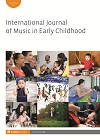- Home
- A-Z Publications
- International Journal of Music in Early Childhood
- Previous Issues
- Volume 17, Issue 1, 2022
International Journal of Music in Early Childhood - Volume 17, Issue 1, 2022
Volume 17, Issue 1, 2022
- Editorial
-
-
-
The importance of storytelling
More LessThis issue contains three peer-reviewed research reports, each of which employs varying empirical procedures to systematically uncover and document individuals’ stories. In addition to representing various research methods, these three studies investigate the lived experiences of different participants in early childhood music. The final two contributions in the issue have connections to the Early Childhood Music & Movement Association (ECMMA), the sponsoring organization of the International Journal of Music in Childhood. Included are transcripts of the two keynote addresses presented at the 2021 ECMMA convention.
-
-
- Research Reports
-
-
-
Where have I been all these years? A narrative case study on the impact of western (mis)conceptions of musicality on a generalist classroom teacher’s music teacher identity construction
More LessAuthors: Christiane Nieuwmeijer, Nigel Marshall and Bert van OersThis article reports a narrative case study on Sanne, an experienced 46-year-old early childhood teacher who considered herself unmusical and therefore unable to teach music, caused by (1) few childhood musical experiences, (2) teacher training that focused on musical performance skills and (3) a professional context with minimal music education. These experiences reinforced her belief that musicality equates to musical performance skills, rendering her ‘unmusical’ – a western conception of musicality which had prevented her from teaching music. Participating in a professional development (PD) programme on musical play, however, positively influenced her music teacher identity (MTI), resulting in confidence to teach music. This article explores what factors contributed to this identity shift. The PD programme was set up according to criteria for effective PD as argued by literature, such as collective participation, demand-driven content, long-term duration and a focus on pedagogical content knowledge (PCK). Data were collected by means of surveys, interviews and e-mails containing video images. Assisted by a three-dimensional space narrative structure, text excerpts were selected from the data and ‘re-storied’ into a narrative. Analysis revealed how a combination of newly acquired PCK and existing general play guidance skills enabled Sanne to facilitate musical play successfully, thereby neutralizing the obstacles raised by her self-perceived non-musicality, and positively affecting her MTI. In the discussion, we reflect on how our current western conception of musicality may negatively affect individuals’ musical identity and provide some further thoughts on the implications of our findings for music educational practice.
-
-
-
-
Lived experiences of first-time caregivers in early childhood music classes
More LessAuthors: Karen Salvador and Whitney MayoWhile scholars are interested in parent perspectives on early childhood (EC) music education, the perspectives of first-time attendees and non-maternal caregivers are relatively unexamined. Using phenomenology as both a method and a theoretical frame, we followed ten caregivers (three fathers and seven mothers) as they engaged in their first experience accompanying their children to play-based, child-led EC music classes. Through analysis of pre- and post-interviews, biweekly e-mail check-ins, memos and field notes from observations, we distilled four essences of first-time experience: being family, fitting in, engaging with others and having fun. In this article, we describe each essence and offer interpretation through our lens as mothers, scholars and EC teachers.
-
-
-
An exploration of at-home parent and child music mediation
More LessAuthors: Kerry B. Renzoni and Nicholas M. StanfordThe purpose of this intrinsic case study was to explore what happened when one family engaged in guided musical play at home with their toddler-aged child. Specifically, we wondered: what roles do the parents assume in guided musical play with their child? What roles does the child assume when engaging in guided home musical play? And how can early childhood music specialists help other parents and children engage in home musical play using similar roles? Seeking answers to those questions, we invited the Merchant family to participate in weekly home music activities that were connected to a weekly music class in which their toddler was enrolled. From our data analysis, two themes emerged: the kitchen served as a space for music making and the adaptation of weekly home music prompts enhanced and extended family music interactions with the toddler.
-
- Interest Articles
-
-
-
The role of music in shaping children’s self-knowledge and identity: Perspectives from an African setting1
More LessMusic-making is a natural childhood activity. This is evidenced by the increase in research and scholarship covering diverse aspects of children’s interaction with music. This keynote address invites us to reflect on the ways in which music shapes young children’s self-knowledge and identity by considering their musical needs, their interactions with music, what they and their adult caregivers experience as they participate in musicking and how this entire encounter may nurture their growing musicality. Acknowledging the influence of context in nurturing musical childhoods, four settings of home, school, church and the community activity of Isukuti performing arts are examined through lenses of social and cultural psychology and African Indigenous knowledge systems. The discussion ends with a call for educators, researchers and practitioners to consolidate ongoing and future efforts in nurturing musical childhoods, particularly by adding the sub-Saharan Africa perspective to the kaleidoscope of global activities that constitute children’s musical journeys
-
-
-
-
Anchoring literacy: Learning through creativity1
More LessAnchor standards are central to various disciplines in education. Music literacy brings important skills that relate to both music education and college–career readiness (twenty-first century) skills. This keynote to the Early Childhood Music and Movement Association discusses how music literacy supports specific English language arts anchor standards and their importance across lifelong learning.
-
Volumes & issues
Most Read This Month


